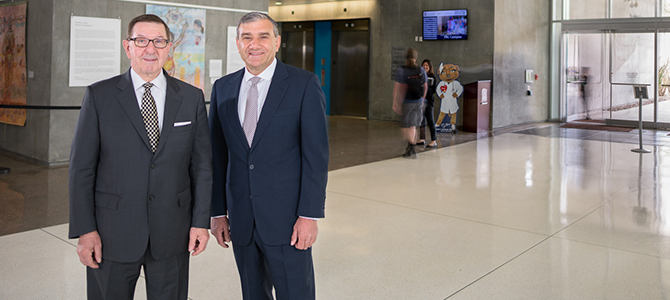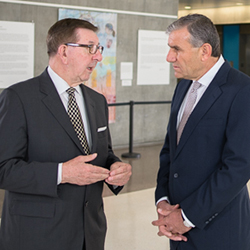
Fast Track to Discovery: Online Course Will Show Researchers How to Bring a Medical Product to Market in Record Time

A new online course offered by the University of Arizona College of Medicine – Phoenix could disrupt the health care industry by showing how to drastically reduce the time and cost from discovery of a medical device or therapeutic until approval for patient care.
The current average time for regulatory approval and reimbursement of a new cardiovascular therapy is 12.5 years at a cost of $2.5 billion.
“This is a new approach to science that expedites the therapy to patients and decreases the cost,” said Nabil Dib, MD, founder of the International Society for Cardiovascular Translation Research (ISCTR). “These are critical steps that have never been taught in medical school.”
The goal of the Cardiovascular Translational Science and Medicine online program is to help leadership from academia, industry, regulatory and reimbursement agencies along with other health care professionals to simultaneously — instead of sequentially — consider the steps of bringing a therapeutic device, drug or biologic treatment to market.
The course was created by Dr. Dib and Robert Roberts, MD, who holds the ISCTR chair at the UA College of Medicine – Phoenix. The two are renowned researchers who have made groundbreaking contributions in cardiology. Both are professors at the UA College of Medicine – Phoenix.

The introductory course, consisting of 74 lectures and discussions, is presented by internationally known speakers from academia, industry, the FDA and health care. Registration is open now and the first course begins in May 2018.
“The translational pathway from concept to marketing is complex, and challenged by several necessary barriers relating to safety, efficacy, regulatory and reimbursement requirements, as well as physician education, awareness and acceptance,” Dr. Roberts said. “Our intent in developing this course is to expedite scientific discovery to clinical applications.”
The program’s structure aligns with the FDA approval process, and participants can choose to follow specialized pathways in Cardiovascular Devices, Drugs or Biologics. Lectures include modules on clinical and basic science, engineering and product development, imaging, regulatory and reimbursement requirements, statistics, clinical practice guidelines, intellectual property, 3D-printing and the role of Medicare and Medicaid in development and innovation.
“If you look at the failure rate and cost, less than 10 percent of therapeutics get to the finish line,” said Dr. Roberts, who co-discovered more than 60 genes related to coronary artery disease. “Most people have no idea what they have to go through when bringing a drug or therapeutic to market. This course will make researchers and physicians aware of the hoops and will hopefully help knock off three or four years from the process.”
One of the goals of the ISCTR is to bring more treatments for heart and vascular disease to market. By accelerating the time and reducing the cost to develop a therapeutic, the society hopes this will translate into more and better treatments for patients.
The course is offered through the University of Arizona Office of Continuing and Professional Education and the UA College of Medicine – Phoenix. Those who finish the program will receive a certificate of completion.
The program is designed for anyone with an undergraduate degree and an interest in health care and developing therapeutics.
“We hope to interest physicians, scientists and those employed in industries that develop medical devices, drugs or pharmaceuticals as well as nurses, professionals in public health and policymakers,” Dr. Dib said.
About the College
Founded in 2007, the University of Arizona College of Medicine – Phoenix inspires and trains exemplary physicians, scientists and leaders to advance its core missions in education, research, clinical care and service to communities across Arizona. The college’s strength lies in our collaborations and partnerships with clinical affiliates, community organizations and industry sponsors. With our primary affiliate, Banner Health, we are recognized as the premier academic medical center in Phoenix. As an anchor institution of the Phoenix Bioscience Core, the college is home to signature research programs in neurosciences, cardiopulmonary diseases, immunology, informatics and metabolism. These focus areas uniquely position us to drive biomedical research and bolster economic development in the region.
As an urban institution with strong roots in rural and tribal health, the college has graduated more than 1,000 physicians and matriculates 130 students each year. Greater than 60% of matriculating students are from Arizona and many continue training at our GME sponsored residency programs, ultimately pursuing local academic and community-based opportunities. While our traditional four-year program continues to thrive, we will launch our recently approved accelerated three-year medical student curriculum with exclusive focus on primary care. This program is designed to further enhance workforce retention needs across Arizona.
The college has embarked on our strategic plan for 2025 to 2030. Learn more.